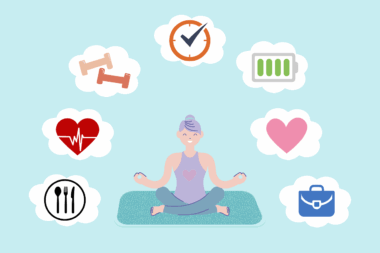Journaling as a Tool for Mindfulness and Physical Vitality
Journaling, a powerful practice, helps forge the mind-body connection by promoting mindfulness and enhancing physical health. Engaging in journaling allows individuals to explore their thoughts and feelings, facilitating self-examination. This reflection encourages awareness of mental states and the influence they have on overall well-being. Individuals can experience significant shifts in their emotional landscape, leading to reduced stress and anxiety. Furthermore, the act of writing helps to clarify thoughts, paving the way for deeper understanding and communication with oneself. When we articulate our inner experiences, we can identify stressors and emotional triggers, which is vital for personal growth. Therefore, integrating journaling into your daily routine can play a crucial role in enhancing mindfulness. By setting aside time to write, you create a space for introspection and self-care. The physical act of journaling can also have notable benefits for physical vitality. Studies suggest that people who engage in expressive writing often report improved immune function and overall health. With this knowledge, it’s no surprise that journaling is increasingly recognized as a valuable tool for fostering the mind-body connection.
To effectively harness journaling for mind-body health, it’s essential to establish a consistent routine. Consistency reinforces the habit and deepens its impact on emotional clarity and physical vitality. Start with a designated time each day to reflect on your experiences, emotions, and thoughts. This could be early morning or before bedtime, depending on personal preference. The setting should be comfortable, free from distractions, encouraging focus on the inner dialogue. Choosing the right journal is also crucial; select one that inspires you to write. This could be a beautifully bound notebook or a digital platform, allowing for a more personal touch. Prompts can guide initial writing sessions, making it easier to dive deep into your feelings and observations. Some effective prompts include “What resonates with me today?” or “What challenges did I face that I can learn from?” Over time, journaling becomes a safe space for expressing thoughts and feelings. As you write consistently, you may notice increased self-awareness and a stronger connection to your physical feelings. It’s a pathway to mindfulness that not only emphasizes mental engagement but also enhances bodily awareness.
Benefits of Expressive Writing
Engaging in expressive writing offers numerous advantages for both mental and physical health. This method of journaling encourages unrestricted self-expression, allowing you to articulate emotions that might otherwise remain locked. By doing so, you create a narrative that fosters healing and growth. Studies indicate that individuals who regularly practice expressive writing experience lower levels of anxiety and depression. They also report significant improvements in psychological well-being. Writing about personal experiences permits a release of pent-up emotions, transforming them into manageable narratives. Additionally, there is a fascinating connection between expressive writing and physical health. Researchers have observed that journaling can enhance immune function, reducing susceptibility to illnesses. When stress decreases, bodily functions improve. This creates a virtuous cycle where improved mental health leads to physical vitality. Moreover, logging daily experiences helps in processing traumatic events, enabling individuals to move forward with enhanced coping strategies. Therefore, integrating expressive writing into your routine is a simple yet profound approach to promote mindfulness. As you pen down your thoughts, you simultaneously nurture your mind and body, reinforcing an important mind-body connection that is vital for holistic well-being.
Incorporating mindfulness techniques into your journaling practice can further amplify its benefits. Mindfulness centers on being present in the moment, cultivating awareness of thoughts, feelings, and bodily sensations. Start by consciously engaging your senses as you write. An effective way to do this is to include specific details about your surroundings, such as colors, sounds, and smells. This practice not only enriches your journal entries but also grounds you in the present moment. Consider multi-sensory approaches like connecting with nature while journaling. Writing outdoors allows for inspiration from the natural world, enhancing the mind-body experience. Additionally, incorporating breathwork into your journaling session can help calm the mind and promote clear thinking. Before starting, take a few deep breaths to center yourself. This simple act encourages a relaxed state, conducive to reflective writing. Keep your entry focused on how you feel physically during this process. Such awareness transforms journaling into a body-centered practice, strengthening the mind-body connection. Furthermore, returning periodically to these entries can reveal growth and insights, making writing a valuable tool for self-discovery and wellness.
Setting Intentions through Journaling
Setting intentions is a powerful aspect of journaling that links the mind and body in a dance of purpose. Intentions represent your deepest desires and aspirations for the future, bridging the gap between thought and action. To set intentions effectively, begin by reflecting on what truly matters in your life. Thoughts may revolve around health, relationships, career aspirations, creativity, or self-love, among others. Write these intentions in your journal to reinforce and clarify what you aim to achieve. Consider incorporating affirmations alongside these intentions, which can help instill a positive mindset. An intention could be framed as, “I will prioritize my health by engaging in physical activity daily.” By writing this down, you create a commitment to manifest positive changes. Each journal session can thus evolve into a visioning practice, allowing you to map out steps towards your intentions. Revisiting these entries inspires accountability and motivation. This ongoing process not only strengthens the commitment to your intentions but also nurtures the mind-body connection, as your body begins to respond to these affirmations through aligned actions.
In addition to setting intentions, reflecting on your emotional and physical state while journaling can foster a deeper understanding of the mind-body connection. Begin each session by noting your current emotions and any physical sensations you might experience. This dual approach provides insight into how your state of mind influences your physical body, revealing an intricate tapestry of interconnections. For instance, you might observe tightness in your shoulders when stressed or an optimistic feeling after a period of gratitude. These observations can help you recognize patterns in your emotional experiences and their physical manifestations. As a result, journaling becomes a tool for awareness and transformation. Consider creating a dedicated section in your journal for this purpose, where you can regularly track these observations. Over time, this data can unveil trends in your health and emotional states, guiding you towards practices that nurture both areas. Furthermore, such insights can prompt discussions with health professionals, enriching your holistic health journey. As you navigate this terrain, the body and mind converge, creating a harmonious interplay that empowers your well-being.
Conclusion: The Journey of Journaling
Reflecting on your journaling journey, it’s essential to recognize the transformative power it holds for both mindfulness and physical vitality. Consider journaling as a lifelong tool, adapting and evolving with your needs and insights. This practice encourages continual self-assessment, making it an invaluable ally in managing stress and enhancing well-being. As your relationship with journaling deepens, you may find that it facilitates a stronger connection to your physical body. Each entry reflects your thoughts, feelings, and experiences, acting as a mirror to your inner world. Moreover, sharing your journaling experiences with others can foster community and support. Whether through workshops, online forums, or social media, connections with like-minded individuals deepen the understanding of the mind-body connection. These interactions may even inspire new journaling techniques or prompts, expanding your practice beyond personal exploration. With a consistent approach, journaling helps cultivate resilience, mindfulness, and awareness, paving the way for your holistic health journey. Ultimately, it’s an act of self-care that opens doors to higher self-awareness, promoting both emotional and physical vitality as you navigate through life.
In the world of today, maintaining a balance between mind and body is essential for overall health. Journaling emerges as an effective tool in this balance, allowing individuals to explore thoughts, feelings, and bodily sensations. As you reflect on your experiences and feelings, patterns emerge that highlight areas requiring attention. Through this practice, you embark on a journey toward greater mindfulness, becoming aware of emotional triggers and responses. This awareness facilitates personal growth and fosters emotional resilience. Engaging the mind through writing encourages clarity and growth, revealing what serves your well-being and what does not. With each entry, you reinforce the mind-body connection, nurturing both aspects and cultivating a sense of overall vitality. Moreover, the act of putting thoughts to paper allows for increased presence and self-awareness. By creating a safe space for reflection, journaling can bring transformative insights into daily life. As you journey through, the integration of physical sensations within each entry enhances overall self-awareness. Utilize journaling as a guide toward mindful living, promoting harmony between mental and physical health as you navigate life’s complexities.








